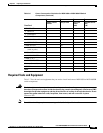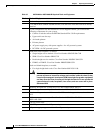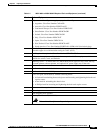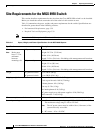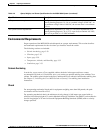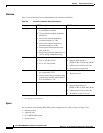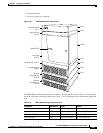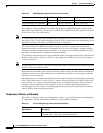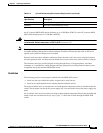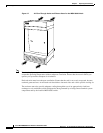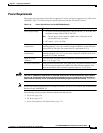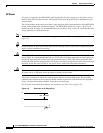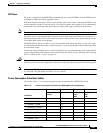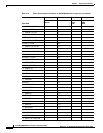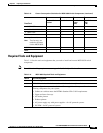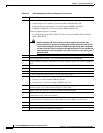
3-33
Cisco MGX 8800/8900 Series Hardware Installation Guide
Releases 2 - 5.2, Part Number OL-4545-01, Rev. H0, May 2006
Chapter 3 Preparing for Installation
Site Requirements for the MGX 8950 Switch
An AC-powered MGX 8950 switch dissipates up to 14,300 Btus (4200 W), and a DC-powered MGX
8950 switch dissipates up to 12,300 Btus (3600 W).
Warning
To prevent the system from overheating, do not operate it in an area that exceeds the maximum
recommended ambient temperature of 104°F (40°C).
Statement 1047
Note Electrical equipment generates heat. Ambient air temperature might not be able to cool equipment to
acceptable operating temperatures without adequate circulation. Ensure that the room in which you
operate your system has adequate air circulation.
Enclosed racks must have adequate ventilation. Ensure that the rack is not overly congested, because
each unit generates heat. An enclosed rack should have louvered sides and a fan to provide cooling air.
The enclosure must also provide adequate cooling through the use of an appropriately sized heat
exchanger or air conditioner, which dissipates the heat generated by existing remote terminal system
components and by the installed MGX 8950 switch.
Ventilation
The following practices ensure proper ventilation for the MGX 8950 switch:
• Install two fan trays within the switch: an upper and a lower fan tray
• Install an air intake plenum and an exhaust plenum within the switch
The main air intake vents are located in the air intake plenum component, which is installed under the
switch. The air intake vent for the AC power supply tray is located on the front of the power supply tray
panel.
All air exhaust vents are located at the rear of the exhaust plenum component. Ensure that the intake and
exhaust vents are not obstructed in any way. Figure 3-7 shows the air flow through the MGX 8950
switch.
Altitude up to 10,000 feet (up to 3048 meters)
Humidity 10 to 80% (noncondensing) at 50ºC
1. The switch can run up to 122ºF (50ºC) for up to 72 hours.
Table 3-11 CO and PE Operating Environment Requirements (continued)
Environmental
Specification Description



